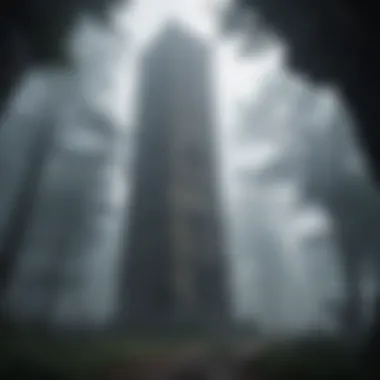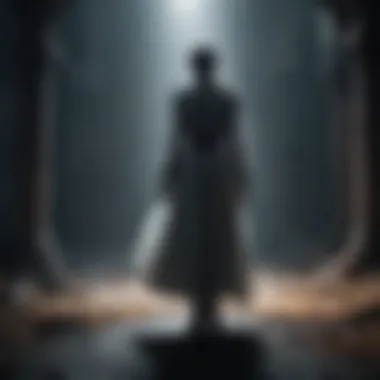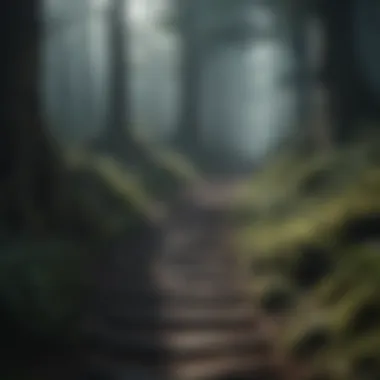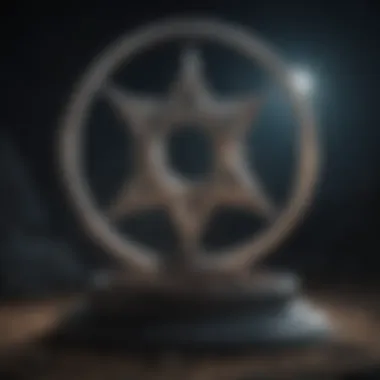Unraveling the Enigmatic Dark Tower Phenomenon: A Comprehensive Exploration


Overview of Cinema/TV shown/Games/Comic Books
The Dark Tower saga, a cinematic marvel enveloping the minds of fans worldwide, transcends the realms of conventional storytelling. With enigmatic characters shrouded in mystery and haunting landscapes that grip the imagination, the saga stands as a testament to the intricacies of world-building. This section will unravel the tapestry of cinema, TV shows, games, and comic books that form the Dark Tower universe, offering a glimpse into the deep-rooted lore and impact it has left on popular culture.
In-Depth Analysis
Delving into the depths of the Dark Tower phenomenon reveals a tapestry of narratives intertwined with elements of intrigue and suspense. The plot summary and analysis offer a peek into the intricacies of the storyline, weaving through twists and turns that challenge the conventional norms of storytelling. Character development within the saga goes beyond the surface, diving into the psyche of each persona, unraveling their motivations and complexities. The setting and cinematography of the cinematic and TV adaptations create a visual feast for the viewers, encapsulating the essence of the Dark Tower universe. In the realm of games and comic books, gameplay mechanics and artistic prowess converge to provide a multi-sensory experience, immersing audiences in the rich tapestry of this enigmatic world.
Behind the Scenes
Peeling back the layers of the Dark Tower saga unveils a realm of creativity and innovation that breathes life into the narrative. Interviews with the cast and crew offer a glimpse behind the curtains, showcasing the dedication and talent that drive the saga forward. The development process for games and comic books highlights the meticulous attention to detail poured into each creation, crafting an interactive and visually stunning experience. Production insights from the cinematic and TV adaptations shed light on the challenges and triumphs faced during the realization of this elaborate universe.
Reviews and Recommendations
Critics and users alike have delved into the Dark Tower universe, offering a myriad of perspectives on the saga. Critic reviews and ratings dissect the nuances of storytelling and production quality, providing insights into the critical reception of the franchise. User reviews and comments add a personal touch, reflecting the emotional connection fans forge with the characters and worlds within the saga. Recommendation lists, ranging from top picks to hidden gems, serve as a guide for both seasoned enthusiasts and newcomers, enriching the exploration of the Dark Tower phenomenon.
Introduction
Explore a captivating journey into the realm of the Dark Tower phenomenon, a saga shrouded in mystery and depth that has left an indelible mark on popular culture. The allure of the Dark Tower lies in its ability to transport readers and viewers into a hauntingly enigmatic world where characters grapple with destiny, redemption, and the interplay of multiverses. This article serves as a beacon, guiding enthusiasts of cinema, TV, games, and comics through the labyrinthine narrative of the Dark Tower, unveiling its layers of complexity and thematic richness. By dissecting the origins, themes, characters, and critical reception of the Dark Tower universe, readers are poised to embark on a profound exploration that transcends mere fantasy. From the eerie landscapes of Mid-World to the futile pursuit of the titular tower, every facet of this saga beckons attention and analysis, offering a fertile ground for intellectual discourse and creative engagement.
Origins of the Dark Tower
The exploration of the Origins of the Dark Tower holds profound significance within this intricate article. By delving into the genesis of the Dark Tower phenomenon, readers are provided with a foundational understanding that sets the stage for the enigmatic world that unfolds within the saga. Understanding the origins of this mysterious construct is paramount in unraveling the complexities of the narrative, as it sheds light on the evolution of characters, plots, and settings that define the Dark Tower universe. Analysing the inception of the Dark Tower offers invaluable insights into how creator Stephen King wove together elements from various sources to craft a multilayered and immersive storyline that continues to captivate audiences across different mediums.
Stephen King's Inspiration


Stephen King's Inspiration serves as a cornerstone in the creation of the Dark Tower saga. With a compelling narrative vision, Stephen King draws from a deep well of creativity to envision a world that transcends traditional genre boundaries. The influence of King's own experiences, fears, and vivid imagination is evident in the intricate tapestry of characters and events woven throughout the story. His unique storytelling prowess is on full display as he crafts a tale that intertwines elements of horror, fantasy, and western genres seamlessly, creating a rich and diverse narrative that resonates with readers on multiple levels.
Literary Influences
Exploring the Literary Influences behind the Dark Tower saga unveils a tapestry of references and nods to various works that have influenced Stephen King's storytelling. From classic literature to modern fiction, King's narrative is laced with subtle tributes and allusions that enrich the tapestry of the Dark Tower universe. By examining the literary influences shaping the saga, readers gain a deeper appreciation for the interconnected web of inspiration that fuels King's creative process. Each literary reference serves as a breadcrumb that leads readers on a journey through a maze of genres and styles, offering a nuanced understanding of the depth and complexity of the Dark Tower's narrative landscape.
Key Themes and Motifs
When delving into the depths of the Dark Tower saga, one cannot ignore the significance of its key themes and motifs. These elements serve as the foundational pillars that uphold the intricate narrative tapestry woven by Stephen King. The exploration of redemption and destiny resonates profoundly throughout the storyline, infusing the characters' arcs with purpose and resolution.
The theme of redemption carries a weighty presence in the Dark Tower universe, manifesting in the personal journeys of characters like Roland Deschain and the haunting choices they must confront. The notion of destiny intertwines with redemption, casting a foreboding shadow over the protagonists' paths. Each action and sacrifice made in the name of redemption shapes the course of the narrative, giving depth and poignancy to the tale's progression.
On the other hand, the concept of multiverse and parallel realities introduces a layer of complexity that elevates the Dark Tower saga to unparalleled heights. The exploration of alternate dimensions and diverging fates adds a sense of intrigue and unpredictability to the storyline. Characters move through these parallel realities, grappling with versions of themselves and facing divergent challenges that test their resolve. The intricacies of the multiverse serve as a playground for Stephen King's imagination, offering endless possibilities and narrative twists that captivate and enthrall readers.
In essence, the key themes and motifs of redemption and destiny along with the multiverse and parallel realities not only enrich the Dark Tower saga but also invite readers to contemplate deeper existential questions. These elements elevate the narrative from a mere tale of adventure to a profound exploration of human nature and the cosmic forces that shape our destinies.
Redemption and Destiny
The theme of redemption in the Dark Tower saga stands as a powerful force that drives the actions and decisions of its characters. Roland Deschain, the Gunslinger, embodies the quest for redemption as he navigates a path riddled with moral dilemmas and personal sacrifices. His unwavering resolve to reach the Dark Tower is fueled by a desire to atone for past sins and find purpose in a world on the brink of collapse.
Destiny, a looming specter in the narrative, weaves its threads intricately through the lives of the characters, steering them towards fateful encounters and decisive moments. The concept of a predetermined fate challenges the protagonists to confront their inner demons and embrace their roles in the larger cosmic drama unfolding around them. The exploration of destiny in the Dark Tower saga is not merely a plot device but a thematic undercurrent that underpins the philosophical inquiries woven into the narrative fabric.


Multiverse and Parallel Realities
The concept of a multiverse in the Dark Tower saga opens doors to a myriad of possibilities and alternate realities that coexist alongside the primary narrative. This intricate web of parallel worlds introduces a sense of fluidity and unpredictability, wherein choices made in one reality reverberate across multiple dimensions.
Character interactions across these parallel realities offer a glimpse into the intricacies of identity and fate, showcasing how divergent paths can lead to vastly different outcomes. The exploration of parallel realities enriches the storytelling experience, providing a canvas upon which Stephen King paints multifaceted characters and captivating conflicts.
Overall, the multiverse and parallel realities within the Dark Tower saga serve as a testament to the boundless imagination of its creator and a cornerstone of the series' enduring legacy.
Protagonists and Antagonists
Protagonists and Antagonists play a pivotal role in shaping the narrative of the Dark Tower saga. The juxtaposition of Roland Deschain - The Gunslinger and The Man in Black - Dark Sorcerer creates a dynamic interplay of forces that drives the storyline forward. Roland Deschain embodies the essence of a stoic yet determined hero on a quest for redemption, while The Man in Black exudes malevolence and mystery, serving as a formidable antagonist. Their conflict symbolizes larger themes of destiny and the eternal struggle between light and darkness.
Roland Deschain - The Gunslinger
Background and Characterization
In delving into Roland Deschain's background and characterization, we uncover a complex tapestry of a character driven by a sense of duty and honor. His relentless pursuit of The Man in Black is fueled by a tragic past marked by betrayal and loss. Roland's unwavering dedication to his quest, coupled with his internal turmoil and moral ambiguity, sets him apart as a multifaceted protagonist. The depth of his character lies in his moral grey areas, where traditional notions of heroism are challenged, adding layers of sophistication to the narrative.
Journey and Quest
Roland's journey and quest form the backbone of the Dark Tower saga, guiding readers through a vast and treacherous multiverse. His quest for the Dark Tower is not just a physical journey but a profound exploration of self-discovery and sacrifice. The allure of the Tower and the obstacles he faces along the way test his resolve and character, compelling readers to reflect on the nature of destiny and the pursuit of one's ultimate purpose. Roland's odyssey is a testament to the power of perseverance and the complexities of the human spirit.
The Man in Black - Dark Sorcerer


Mysterious Origins
The enigmatic origins of The Man in Black shroud him in a veil of mystique and intrigue. His dark powers and malevolent presence hint at a history steeped in forbidden knowledge and dark rituals. The ambiguity surrounding his past adds an aura of terror and fascination to his character, elevating him beyond a mere adversary to a sinister force of nature. The mysteries shrouding The Man in Black serve to instill a sense of dread and anticipation, keeping readers on edge as they unravel the secrets of his genesis.
Conflict with Roland
The conflict between The Man in Black and Roland Deschain forms the crux of the Dark Tower narrative, symbolizing a battle of ideologies and destinies. The tension between these two characters is palpable, representing a cosmic struggle that transcends mere physical combat. The contrasting motives and methods of Roland and The Man in Black create a rich tapestry of moral complexity and thematic depth, challenging readers to question the nature of good and evil. Their conflict is not just a clash of swords but a clash of worldviews, making it a compelling exploration of the human condition within the realms of fantasy and reality.
The Dark Tower Universe
The exploration of The Dark Tower Universe in this article uncovers the intricate tapestry of interconnected worlds and dimensions crafted by Stephen King. This universe serves as the overarching backdrop within which the entire saga unfolds, playing a pivotal role in shaping the narrative's complexity and depth. By delving into the fabric of this universe, readers are plunged into a realm where time, space, and reality intertwine in a mesmerizing dance of creation and destruction. Understanding The Dark Tower Universe is crucial to grasping the profound nature of the saga, as it forms the very essence of the enigmatic Dark Tower's existence and power.
Mid-World and End-World
Mid-World and End-World stand as stark contrasts within The Dark Tower Universe, each representing unique realms with distinct characteristics and significance. Mid-World, a desolate landscape marked by decay and resilience, serves as the primary setting for Roland Deschain's epic quest towards the Dark Tower. End-World, on the other hand, embodies the ultimate nexus of realities, where time and space converge in a cryptic fusion of beginnings and endings. The exploration of these two pivotal domains unveils the dichotomy of hope and despair, creation and annihilation, echoing the eternal struggle for balance within the cosmos.
Citadel of the Crimson King
The Citadel of the Crimson King emerges as a foreboding bastion of malevolence and power within The Dark Tower Universe. Nestled at the heart of discord and chaos, this citadel stands as a symbol of defiance against the forces of harmony and order. Veiled in shadows and secrecy, it serves as the stronghold of malevolent entities seeking to unravel the very fabric of reality. The exploration of the Citadel of the Crimson King delves into the depths of depravity and darkness, unraveling an intricate tapestry of deceit and manipulation. Within its crimson walls lie secrets that challenge the very essence of existence, beckoning explorers to confront their deepest fears and desires.
Critical Reception and Legacy
In delving deep into the Dark Tower phenomenon, the critical reception and legacy of this complex masterpiece hold significant importance. Examining the critical reception unveils the layers of analysis and interpretation that have adorned this work of fiction. A work of this magnitude often elicits divergent critiques, ranging from admiration for its intricate storytelling to debates on its thematic depth. Understanding the legacy of the Dark Tower entails recognizing its enduring impact on literature and popular culture as a whole. The interplay between critical reception and legacy shapes the narrative around the Dark Tower, solidifying its position as a seminal work in the realm of dark fantasy.
Literary Acclaim
When exploring the landscape of literary acclaim within the Dark Tower universe, one encounters a plethora of rich accolades and accolades. The work of Stephen King, the mastermind behind this intricate tapestry, has garnered praise for its innovative storytelling and multidimensional characters. Critics and readers alike have lauded King's ability to weave together disparate elements into a cohesive and compelling narrative. The depth of literary acclaim surrounding the Dark Tower saga underscores its significance within the realm of contemporary fiction. By delving into the nuances of this acclaim, one can gain a deeper appreciation for the artistry and vision inherent in King's magnum opus.
Cinematic Adaptations
Turning to the realm of cinematic adaptations, the Dark Tower saga has traversed a challenging path from page to screen. The transition from literature to cinema often poses inherent challenges, requiring filmmakers to capture the essence of the written word while translating it into a visual medium. Cinematic adaptations of beloved works like the Dark Tower demand a delicate balance between faithfulness to the source material and creative reinterpretation. Exploring the evolution of the Dark Tower on the silver screen provides insights into the complexities of adaptation and the challenges of satisfying both fervent fans and casual viewers. By examining the nuances of cinematic adaptations, one can appreciate the diverse interpretations that arise when iconic literary works transcend the boundaries of the page.



